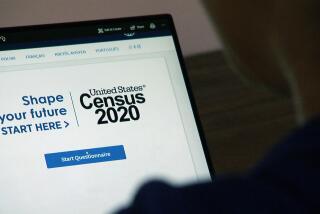Questions and Answers on the Census
- Share via
Maybe you haven’t filled out a census form before, or the past decade has turned memories of the last one a bit foggy. Here are some common questions about the 1990 U.S. Census, and some answers:
Q. When will I get the census form? How do I get one?
A. Most people will get one via the U.S. Postal Service. The Census Bureau will mail questionnaires to more than 100-million households across the country on March 23. All you have to do is complete it with a pencil and mail it back by April 1, which is the official Census Day.
Q. How long will it take to fill one out? A. The questionnaire comes in two forms. One of every six U.S. households will receive a copy of the “long form,” which takes about 43 minutes to complete, according to census officials. But the rest will get the “short form,” which takes an average of 14 minutes to fill out.
Q. What if I don’t get a form in the mail or lose it?
A. Don’t worry. Just call one of the bureau’s local district offices (Orange County has four of them) and ask for a replacement.
Q. Why is the government taking the census?
A. The census is conducted at the start of each new decade to determine the nation’s population so seats in Congress can be properly apportioned. The population counts are also used to divide $30 billion in federal money and even more from the states for a variety of government programs--transportation improvements, social services, health care. Statistics derived from the census are used by academic researchers, business marketeers, civic planners and others for a variety of purposes.
Q. What kinds of questions are on the census?
A. The short form asks seven questions about you and your family--including your sex, ethnic origin and race, age and marital status. It also has seven queries about your household, such as how much your home cost and how many rooms it has.
The long form includes all those questions and more--59 in all. It asks about your home’s plumbing and kitchen facilities, whether you have a telephone, how many cars you have, the cost of utilities, how much you pay for insurance. It also inquires about your schooling, job, income, how well you speak English, military service, whether a health condition makes it difficult to get around and how long it takes you to get to work. And a lot more.
Q. Aren’t some of those questions kind of personal?
A. They’re all very personal--and very important. Each one is on the form for a specific purpose. Data on commuters can be used to build a better transportation system, statistics on income levels can help authorities determine where to funnel money for housing assistance.
It’s important to remember that all the information is, by law, confidential. The census bureau does not release information on an individual for 72 years (the average American’s life span).
Each respondent’s questionnaire can only be viewed by authorized census personnel. It cannot be released to other government agencies such as the Internal Revenue Service or FBI. The Census Bureau boasts of its nearly spotless record, noting that employees who have leaked information have been jailed.
Q. What happens if I don’t mail in my census questionnaire by April 1?
A. Eventually, the Census Bureau will come after you. A few weeks after Census Day, the bureau begins its follow-up operation, visiting people who have not returned a form. The census takers will have red, white and blue briefcases and plastic identification tags. You can’t miss them. They’ll be the ones asking all the questions.
Q. Do I have to participate?
A. That’s one of those gray areas. Census officials say participation is the patriotic thing to do. It’s also the law. The same federal regulation that makes the census confidential also requires a U.S. resident to answer the questions to the best of his or her knowledge. The penalty is a $100 fine.
But some people refuse to participate, either out of an unfounded fear or a dislike of prying surveys. It rarely seems to matter. Census officials could not cite one case where they have prosecuted someone who refused to participate in the national survey.
Q. I recently noticed some people who are living full-time in a tent at a campground down the street from my house. Will they be counted?
A. Yes. Aside from sending out questionnaires to millions of U.S. households, the bureau conducts several programs to count people without fixed addresses. Beginning the night of March 20, the bureau will tally the homeless. On March 31, the census will conduct “transient night,” counting people living in campgrounds, YMCA’s, youth hostels, with traveling carnivals or other vagabond enterprises.
Q. How soon will we get census results?
A. The nation’s population and Congressional apportionment counts are not expected until the end of 1990. Other statistics will be released between 1991 and 1993.
More to Read
Inside the business of entertainment
The Wide Shot brings you news, analysis and insights on everything from streaming wars to production — and what it all means for the future.
You may occasionally receive promotional content from the Los Angeles Times.










